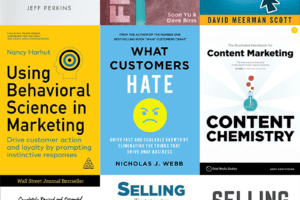???? Episode 111 of Yes, and Marketing
Link-building is harder than ever, thanks in part to the pandemic and politics creating an increasingly noisy news cycle over the last few years.
Wondering how to cut through the noise?
On this episode, Steve talks with Paddy Moogan, co-founder and CEO of Aira, the agency behind the marketing industry’s annual State of Link Building report. Paddy shares some of the tactics Aira is using to help their clients build links in the current environment, in addition to his thoughts on agency life, how we should be thinking about SEO today, and a few of his lessons as a first-time CEO.
Listen to the full interview above or read on for our highlights from the conversation. You can also view excerpts from all our episodes on our show page.
???? Who is Paddy Moogan?
What he does: Co-founder of digital marketing agency Aira.
Find Paddy on the web: Aira | LinkedIn | Twitter
Get smart: “Spend a disproportionate amount of time on your strengths rather than trying to fix problems and fix weaknesses.”
???? Episode Highlights
Read verbatim excerpts from our interview with Paddy Moogan.
The value is in doing, not reading
“You can read about SEO all day long—there are an infinite number of things you can learn and read about it—but the real value is in getting hands on with a website and actually making a difference to it.”
The most popular tactic for getting links today
“There’s definitely still a huge interest in the content-led link-building approach, where you create a piece of content with the almost explicit purpose of getting links. That’s been quite a popular tactic for probably a decade now, but it’s not really slowing down. …It’s still the most popular tactic that people mention for getting links.”
The impact of a crazy news cycle on link-building
“Generally the consensus and the feedback that we’re hearing, not just in the survey but also from our own team and our own clients, is link-building is getting harder.
And I think with content, one of the reasons for that is because the news cycle, not just in the UK, but worldwide the last couple years, has changed quite a bit. It’s become noisier. It feels like, especially if you work online, there’s always news. There’s always something, whether it’s political, whether it’s the obvious one with the pandemic—every single day there’s news, news, news, being thrown out.
That actually makes it quite hard for us to insert our stories and our content into that really, really busy news cycle.”
Diversity your approach
“Rather than for clients just launching campaign after campaign after campaign, we’re trying to say, ‘Okay, let’s launch one campaign and try a different tactic, then a different tactic,’ and kinda diversify our approach a little bit there, because if we can diversify in that way and get links through other methods, then we’re not too reliant upon this ever-changing, increasingly difficult news cycle.”
Content needs to be link-worthy on its own
“Clients should be creating content that gets links on its own, so it’s not reliant upon us going out and promoting it. We might do that, but it can also get links just because it ranks really well, or just because it’s naturally link-worthy.”
Putting customers before SEO
“I think for brands and companies, it’s really about focusing on what the customer needs from them and just catering to that and almost forgetting about SEO for a second and just saying, ‘Okay, what does the user want here? Let’s do that.’ And then layering the SEO afterwards.
…As opposed to the other way around and thinking, ‘Okay, let’s do the SEO and then worry about, well, actually this product’s not unique, or it’s actually really expensive compared to competitors, or the audience isn’t very well defined.’ Because sometimes we get brought in as an agency too early for a company, where they haven’t got all those things nailed down, and we’re trying to find our way around in the dark.”
The evolution of SEO
“When I first started doing this, you thought about the SEO in terms of ‘You need this many words on the page, or you need to tick these boxes, or you need to fill out these bits of the page to rank.’ And for a long time, that worked really well because it was a process that Google followed. But then as Google has become more advanced, even Googlers themselves can’t tell you why certain sites rank the way they do beause it’s just too complex and there’s a lot going on behind the scenes.”
Domain authority isn’t the be-all, end-all
“One of the big mistakes that I always see is just focusing way too much on the metrics of links.
It’s really easy to use lots of different tools to measure the quality of links. You’ve got things like domain authority from Moz, you’ve got domain authority from Ahrefs, where these companies have tried to put a score on the quality and authority of links.
Now, those are good things to keep an eye on, but I see far too many agencies always getting obsessed over them—and also clients, to be honest, getting obsessed over them—where they say, ‘Okay, we wanna build 20 links this month and we want all of them to be above domain authority of 30,’ and it’s like, ‘Oh, that’s not really the way that those metrics are meant to work, and actually we should be focusing on the kind of almost subjective quality, not an objective score that’s made up by some software company.”
Why Aira invests so much in professional development and training
“A lot of the time, people get promoted into management roles because they’re good at their job—they’re good at SEO, they’re good at content writing, they’re good at design—but then they don’t get given the support to make the transition from being an SEO or designer into an effective manager. So we try to bridge that gap a little bit and promote them, but also give them support to be great managers as well.”
Advice for smaller agencies: Focus
“My advice for smaller agencies who want to scale is to try and not do too much at once.
…When you’re small and growing, it’s very easy to take on any work that comes to you. The classic one for us back when we first started was social media management. …We would get these leads where we say, oh, there’s the opportunity to sell a project, but it wasn’t really our core service or our core level of expertise, but when you are small and when you’re trying to grow, it’s so easy to say yes and then figure out how to do it.
…When you’re young and scrappy, you wanna just grow and get work through the door. So for smaller agencies, I’d say try and avoid that temptation and try and focus on what you are really, really good at, and don’t take on work you are not qualified to work on because it will come back and bite you at some point.”
One mistake he used to make as a first-time CEO
“I used to worry about competitors a lot… Rather than thinking about what we were doing, I was spending more time thinking about what they were doing, and adapting and kind of being reactive.
Whereas now, the way I think of it is, if a competitor is doing something that’s truly, truly awesome, it will find its way to me. It will get to me somehow. I don’t need to go looking for it.”
Letting go of ego
“When I’m planning my week, I have to be very, very disciplined and really focus on, ‘Okay. What’s the most important thing I can do this week to actually make a difference?’ because otherwise I get pulled into stuff that yeah, I might be needed for, that I could add value to—but someone else could actually do just as good a job or better job than me, so actually there’s someone else that should handle that.
And sometimes that’s quite hard to let go of because you wanna be the person that adds value, right? You wanna be the person that helps the most. Accepting that you could do that, but someone else could probably do it better than you and then them actually doing it is actually quite hard on your own ego.”
His contrarian marketing advice
“Don’t worry about fixing your weaknesses as a company or a brand. Just focus on your strengths. Account for the weaknesses—if you’re short on resources, short on expertise, whatever it is, if your product has something that’s not quite perfect, fine—but focus on your strengths. Spend a disproportionate amount of time on your strengths rather than trying to fix problems and fix weaknesses.”
????️ Paddy Moogan Quotes
“Don’t start with the SEO. Start with, ‘Okay, what does the customer want?’ That’s the kind of content we should create.”
“Focusing a bit too much on the metrics and forgetting about what we’re trying to do in the first place is probably one of the most common mistakes I see.”
“We believe very strongly that if we create a great culture and great place to work, that will translate into results for our clients.”
???? Learn More
Check out Aira’s State of Link Building Report for 2022.
Learn more about two marketers Paddy follows:
- Will Critchlow, Paddy’s former boss and the founder of Distilled, who is currently the founder and CEO of SearchPilot.
- Wil Reynolds, founder of Seer Interactive. Paddy says, “He’s one of the few people who does stuff as a company and does stuff for his team where I’m like, ‘Oh, I wish we’d thought of that.’”
Traveling to the UK? Check out Bourton-on-the-Water in the Cotswolds for a quintessential English experience.



